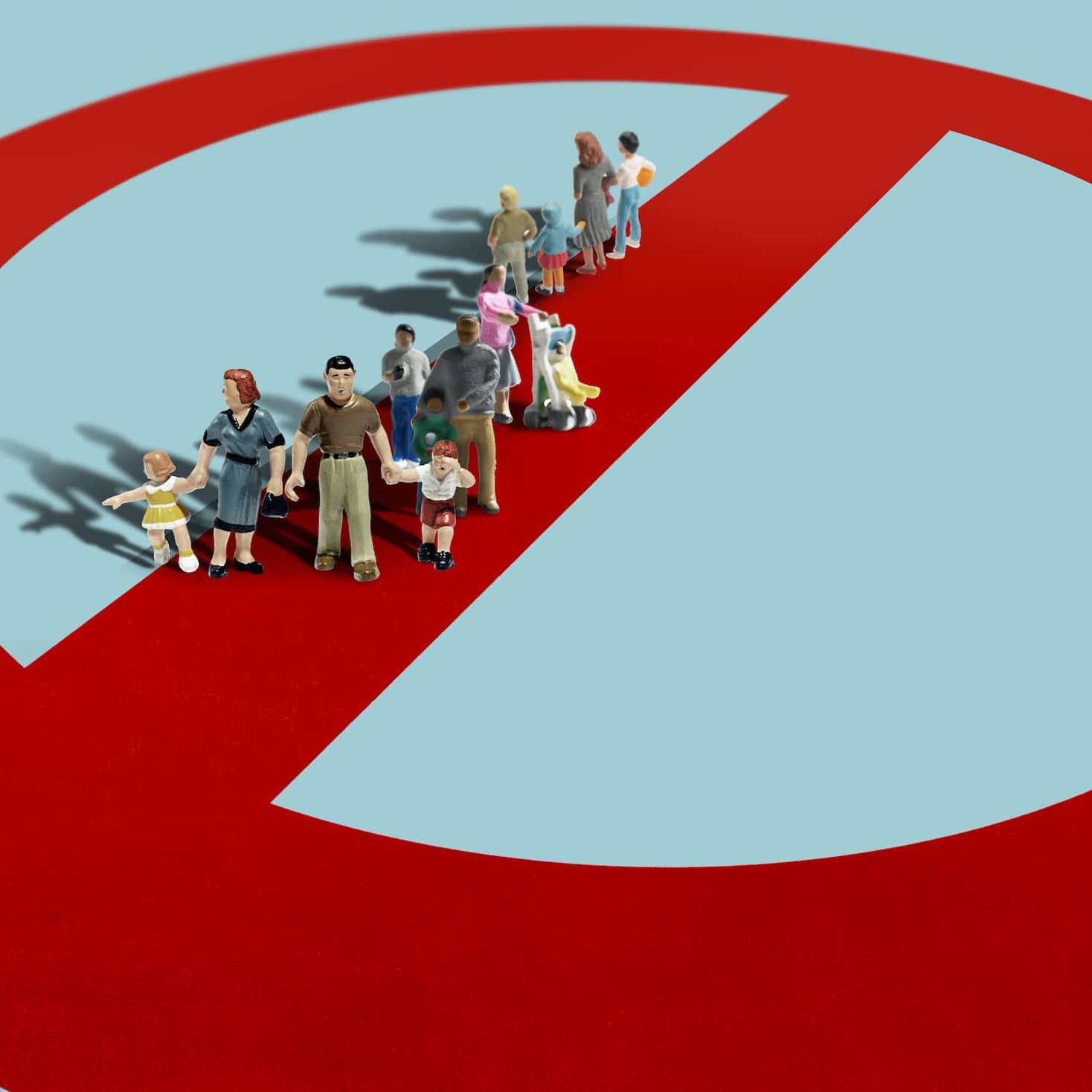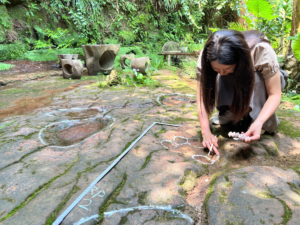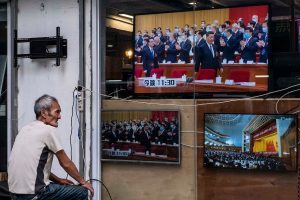The state has introduced new laws that affect nearly every stage of parenting. Some families are choosing between fight and flight.
One afternoon a few weeks ago, Alicea Hotchkiss’s 14-year-old son, Eli, came home from his high school in Tampa with a question about something a classmate had said to him. He’d heard the student use the word “gay” as an insult, so Eli responded the way he always does when this happens. “Hey,” Eli said, “my dad’s gay.” But this time, Eli told his mom, the other kid offered a startling rebuke: You’re not allowed to say that at school.
In a nearby community in central Florida, Barbara Mellen attended a recent open house at her son’s elementary school and asked her child’s teacher to suggest a few titles or authors that might help her second-grader develop more interest in reading. The teacher looked anxious, she says, and told her he couldn’t recommend any books.
In the Facebook group Brittany Minor created five years ago for Black mothers like herself in Orlando, discussions among the 2,800 members have reached new depths of frustration and fatigue. These moms are watching what is happening in Florida,the shifting of the political and cultural environment around them, “and they are tired, they feel helpless, they feel hopeless,” Minor says. “The common thread is that people feel broken.”
Adding to the members’ sense of distress and disorientation, Minor says, is the knowledge that so many of their neighbors supported the state’s pivot from purple to solid red. Under Gov. Ron DeSantis (R), who won reelection in a 20-point landslide in November and is poised for a potential presidential run, Florida has become the “center of gravity” for conservative policymaking, as James Nash, of the bipartisan ROKK Solutions public affairs strategy firm, has previously told The Washington Post. Florida families are now facing a slew of new laws and policy proposals that touch nearly every stage of parenting — from the reproductive health care a pregnant mother can receive, to the books available for an elementary school student to read, to the diversity and social culture awaiting students on college campuses.
The effects are already far-reaching: The Parental Rights in Education Act — widely referred to by critics as “Don’t Say Gay” — prohibits educators in kindergarten through third grade from addressing gender or sexual orientation in class, and restricts what teachers in upper grades can say on the topic. The Stop Wrongs to Our Kids and Employees Act — or Stop WOKE — bars the teaching of critical race theory, an academic framework for examining systemic racism. Books for students of all ages have been removed from public school media centers and classroom libraries after a new state law mandated that all material made available to students be age-appropriate, free of “pornography” and “suited to student needs,” without providing clear guidelines about how those standards are to be applied. Just before the start of Florida’s legislative session this week, GOP lawmakers introduced a slate of new bills that would further overhaul both K-12 and higher education — expanding the limitations on teaching gender or sexual identity through eighth grade, and requiring teachers to use pronouns that match a child’s sex as assigned at birth, among other proposals.
Beyond the public school system, Florida has moved on several fronts. Its medical boards have imposed rules barring transgender children from receiving gender-affirming medical care. On abortion, state law now prohibits the procedure beyond 15 weeks’ gestation, with few exceptions, and a new bill would tighten that restriction to six weeks. And on guns, lawmakers are pushing for legislation that would allow Florida residents to carry firearms without a state license.
At the center of all of this are families trying to navigate the transforming legal landscape of their home state. Parents who do not support these measures describe feeling both fearful and furious. Some have embraced activism for the first time, while longtime advocates have grown more outspoken. Others are just trying to manage what this new reality means for their families and futures.
When Eli wanted to know why his classmate said he couldn’t talk about his father at school, Hotchkiss, a mom of three boys who shares custody of the older two with her ex-husband, sat her son down and reiterated that there is nothing wrong with saying “gay.” But, she told him, a new law in their state means that if teachers talk about sexual orientation in certain ways, they can get in trouble. She had discussed this with her sons before, she says, but now Eli was experiencing the reverberations of the law for himself, and he stared at her, confounded. “But why?” he kept asking.
For families like these in Florida, the difficult questions keep coming.
“How can we allow my kids to be proud of their family if they can’t speak about who I am?” asks Callen Jones, a nonbinary parent with two preschool-age children who refer to Jones as their “baba” rather than “mom” or “dad.”
“A lot of Black moms are saying, ‘Well, we teach our kids about Black history at home anyway’ — but what about the kids who aren’t being taught Black history at home?” Minor says.
“If I leave Florida, then who am I leaving behind?” says Angela Wynn, the mom of a 10-year-old daughter in Sarasota and co-founder of the statewide advocacy group Support Our Schools. “If we go, who is left to fight?”
What’s happening in Florida has made fighters of parents who did not expect to be at the center of such high-stakes political battles, and rallied some who never before considered their politics to be particularly “progressive.”
Seth Stottlemyer, a father of a 5-year-old daughter in Sarasota, has always described himself and his wife as political moderates. They’re both registered under “no party affiliation,” he says — his wife is a former Republican — and they have friends, neighbors and business associates from across the political spectrum. But their daughter is starting kindergarten this fall, and Stottlemyer is increasingly concerned about what is happening to the public school system that awaits her. He’s become more vocal about his views, connecting with other parents who feel the same. He started writing letters to the editor of the local paper, putting his opposition to DeSantis’s laws on record.
“It feels like there are certain elements that are trying to turn the clock back on America, and turn the clock back on our state. The banning of books is a big concern for us,” Stottlemyer says, as is the “whitewashing of American history.” He is also distressed by the targeting of LGBTQ children: “As a parent, and especially with a 5-year-old, I just don’t know what path my daughter’s life is going to take, and it’s scary to think that there are people who are wanting to try to marginalize her.”
In her life before the pandemic, Wynn, the co-founder of Support Our Schools, a nonprofit that advocates for children to receive a safe, inclusive and fact-based public education, had made a point to avoid political activism. Politics felt “like such a beast, this machine, and I felt I couldn’t do anything about it,” she says, “so I tried to not get involved.”
But when DeSantis took aim at mask mandates in public schools before her young children were eligible for vaccines, Wynn started going to school board meetings to push for continued safety measures. She was astonished by the hostility she witnessed there, the anti-mask activists who would spit or sneeze on her after she spoke. She kept going anyway and met other like-minded parents.
“We started to realize that this wasn’t just about masks. It was just the topic of the hour. Then it morphed into targeting critical race theory, and then it morphed into targeting social-emotional learning,” she says. So she and others co-founded Support Our Schools, one of several parent-led organizations that have emerged to counter the rise of conservative groups like Moms for Liberty, which launched in Brevard County with the aim of supporting “parental rights” and has since spread nationwide.
“Once I started going to those meetings, my eyes were forced open,” Wynn says. “Now I can’t keep quiet. I can’t back down. Not with my daughter here.”
The most popular and interesting stories of the day to keep you in the know. In your inbox, every day.
That same determination drives Denise Mestanza-Taylor, a public educator turned home schooling parent who talks openly with her kids about the controversies consuming the public school system. “The topic we just talked about was the state tracking the menstrual cycle for athletes,” she says, referring to a recently abandoned proposal that would have required student-athletes to answer questions about their menstrual history. Mestanza-Taylor says her 17-year-old, who is nonbinary, was outraged by the suggestion that students would have to provide such personal information to school officials. She was proud of her child’s reaction: “These Gen Z kids are going to be the ones to really push back on all this nonsense,” she says.
Minor, the mom in Orlando who created a Facebook group for Black mothers, also draws hope from the younger generation. She recently explained to her 10-year-old daughter that they could no longer donate certain books to the school library, and her child was disappointed and angry, Minor says.
“I told her: ‘Keep the outrage. Communicate it to your teachers,’” Minor says. “I know they won’t be able to respond to it, but let them know that you’re upset about it.”
Minor was encouraged to see the intensity of her daughter’s response; among Minor’s fellow parents, she says, there is mostly a sense of deep exhaustion. They have been advocating in their communities for a long time, Minor says, serving on PTAs and leading get-out-the-vote efforts, and yet nothing seems to change. Now they are overwhelmed and weary, she says.
“I live in the same county as Trayvon Martin. I marched, I drew signs, I did all of it. When White people wanted to do it, I was like — good. When White people get mad, things change,” Minor says. “Black women in particular have always had to fight the good fight for everyone. And now, it feels like we’re waiting to see who is going to get angry enough about all of this. Who is going to fight for us?”
Myndee Fleury Washington, a mom of three and a public middle school teacher in Pasco County, has always made a point of advocating for her children and her students. But she’s grown far more outspoken in recent years, especially since she attended a 2018 school board meeting where residents shared comments about providing safe locker rooms and bathroom access for transgender students. Washington says she watched in shock as a high school student stood up and declared that if he ever found himself in the same bathroom as a “chick” — referring to a transgender male — “they were going to get raped.” But Washington said she was especially horrified by the response from the audience around her: “People were raising their hands up like they were in church and saying ‘Amen, amen.’”
Washington teaches seventh-grade civics; her husband is a former English teacher. Their 19-year-old is nonbinary, and their 16-year-old son is bisexual. “I’m at the crossroads of all these fights, I really am,” she says.
So she has committed herself to setting a strong example for her kids, she says. At a mandatory training session for teachers over the summer, she wore a large button with the words “Say Gay.” When she took her seat, she immediately opened a copy of “The 1619 Project,” a book developed by the New York Times based on its Pulitzer Prize-winning project arguing that slavery was fundamental to America’s founding.
“I fully realize I’m going to get fired at some point. I understand my job is on the line,” Washington says. “I also understand that some things are bigger. It’s so important as a parent that this is the message I give my children: ‘We don’t back down from a fight. We don’t try to make everybody happy when we know something is wrong.’ It’s important for them to know that I stand up for them 1 million percent.”
Among the biggest looming questions — for parents with the ability to choose — is whether to stay in their home, or move their families elsewhere.
Elle Tinnirella settled in Florida with her husband five years ago, never envisioning that she would one day be a pregnant mother in a conservative state after the fall of Roe v. Wade. She is due with her third child this month. “I’m about to be a mother of three daughters, and if we stay in Florida …” she trails off, because staying doesn’t really feel like a viable option anymore.
Her first pregnancy, five years ago, was a traumatic one; she was carrying identical twins, and she lost one of them at 23 weeks. She understands how much can go wrong quickly, she says, and how important it is to have every possible medical option in an emergency.
“Being pregnant here, I was in a state of constant panic until I had the anatomy scan, which gave me a little bit of breathing room,” she says. “But nobody should have to experience that level of fear and anxiety during a pregnancy.”
Now she and her husband are contemplating their young family’s future, and they want their children to learn about Black history, systemic racism and LGBTQ families. If their daughters are gay or trans, “that would not bother us in the least, and we would want to be in a state where we knew we could support them,” Tinnirella says. She wants her daughters to someday have control over their own reproductive health care. “I just feel like when it comes to my children, I need to put them in a place where they’re going to thrive,” she says, “and I don’t see Florida as being that place.”
Jones, the nonbinary parent of two young kids, has heard some people urge families to “stay and fight,” and Jones notes that many of those people are older, or don’t have children who are directly threatened by the laws of the state. “I try to explain that this is an incredibly privileged statement, because it’s showing me that enough of your life is safe and secure that you can comfortably stay,” Jones says. “It’s a different conversation for a parent who is looking at their 13-year-old, trying to make sure that their kid stays alive.”
In moments when she feels overwhelmed and hopeless, Wynn has sometimes wondered if the state where she grew up is still salvageable. Then she remembers how fiercely she loves Sarasota, and how much her daughter loves it, too. She thinks about the nearby beach that is almost entirely composed of quartz crystals, the sand a brilliant, luminescent white. “And then the anger comes,” she says. “Because this is a magical place, and I will not give it up. I will not be bullied out.”
Minor isn’t leaving, either, at least not yet. Her family’s history, her relatives and her community are in Florida. She also sees DeSantis’s policies spreading to other states across the country, and she isn’t sure where exactly she would go.
“Where is it safe to raise a Black son and a Black daughter?” she says. “I know some people are so quick to judge Florida, and sometimes it’s hard to defend. We know we’re a punchline. ‘Florida Man,’ alligators in parking lots — that’s funny, right?” She exhales. “But this is our home. We deserve to live in a place that feels comfortable and safe, and to raise our kids like everyone else.”
Caitlin Gibson is a feature writer at The Washington Post. Since joining The Post in 2005, she has contributed feature stories, essays, long-form enterprise and local news to the paper and The Washington Post Magazine.




